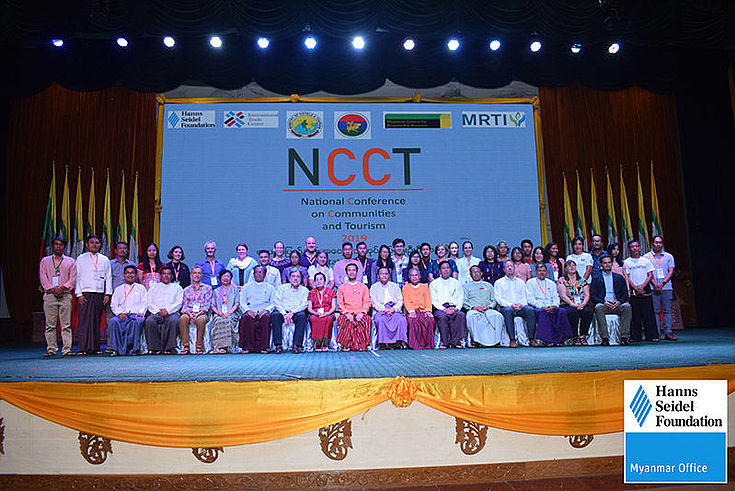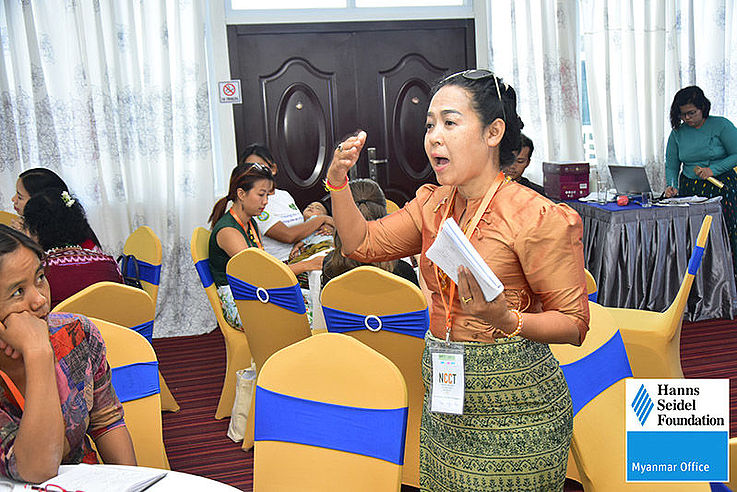Community-centered planning, multi-stakeholder coordination and transparency needed to ensure responsible tourism development in regions
HSF
At the closing ceremony, Chief Minister U L Phaung Sho said “The responsible development of the tourism sector in Kayah State has great potential to support overall state development. The state welcomes all responsible investments which will also benefit the people of Kayah. We acknowledge that we will need to coordinate with all stakeholders including community members, local entrepreneurs, civil society organizations, development partners and the government. The new Tourism Law has been passed and the Kayah State Tourism Committee has been formed. We promise that we will continue coordination efforts and increase transparency. We will not shy away from reforms where necessary and we will make sure these are well-suited to the Kayah context. We are aware that the Government cannot do this alone. We welcome coordination with relevant stakeholders to ensure regional development”.
At one of the panel discussions titled “New Tourism Legal Framework and Decentralization in Myanmar” panelist U Nay Moe Aung from 9 Generation Force Tour Operator said, “As a local entrepreneur and member of the community, I welcome the new Tourism Law and formation of the Committee. However, I believe that a more transparent and better coordinated process is needed to ensure that this regional committee recognizes relevant needs within Kayah State and adopts measures which will support job creation, SME development and properly conserve the cultural and natural environment.” The panel discussed the importance of decentralization in supporting regional development. Regarding licensing and permit application requirements, the panel pointed out that processes need to be decentralized and adapted to respective needs in local states or regions which should be the objective of the law.
In his keynote speech, Pascal Khoo Thwe author of “From the Land of Green Ghosts” and a native Kayan highlighted the importance of a community centered planning approach for regional development and the conservation of cultural and natural environment. He said “Local communities should always be at the centre of the process. Without proper understanding of their ways of life, needs and habitat, business activities are likely to negatively impact the community, which is something we must avoid. We must ensure that community participation is at the heart of the conversation. The more emphasis that is placed on the role of communities, the less challenges the government will face while working towards regional development without compromising cultures and the environment.”
Mr. Leon di Riedmatten, Consultant for the Hanns Seidel Foundation and expert in conflict analysis emphasized the impact stakeholder inclusive community tourism development can have towards supporting sustainable peace in fragile ceasefire agreement areas in his keynote speech titled “Tourism and the Peace Process”.
Daw Khin Sithu, Pyithu Hluttaw MP for Loikaw welcomed participants and also emphasised the importance of community participation and cultural preservation. She also stressed the urgency of multi-stakeholder coordination including parliaments, government, businesses and grass-level communities to ensure responsible business in the region. She said, “Whatever the project is, it will be critical to prioritize the voices of local ethnic communities. Only with that will businesses be effectively supporting regional development in this state”.
On the first two days of the conference panel discussions were held on topics such as
- Responsible and Sustainable Tourism in Myanmar with last year’s MRTA Winners;
- the New Tourism Legal Framework and Decentralization;
- Waste Management;
- Environmental Conservation in Tourism;
- Adventure Tourism Experiences: Opportunities and Challenges; and
- Community Tourism Projects in Myanmar.
The third and final day gave participants the possibility to learn from national and international experts in workshops on
- Storytelling through Digital Marketing;
- Food Waste Management;
- A Participatory Approach to Developing DMOs;
- Tourism Hubs as Support to SMEs;
- Innovation in Tourism;
- Sustainable Product Development: Creating an Experience;
- Community Based Tourism: Model and Implementation (“Fresh from the Field”); and
- Eco-tourism possibilities and chances in Myanmar.


